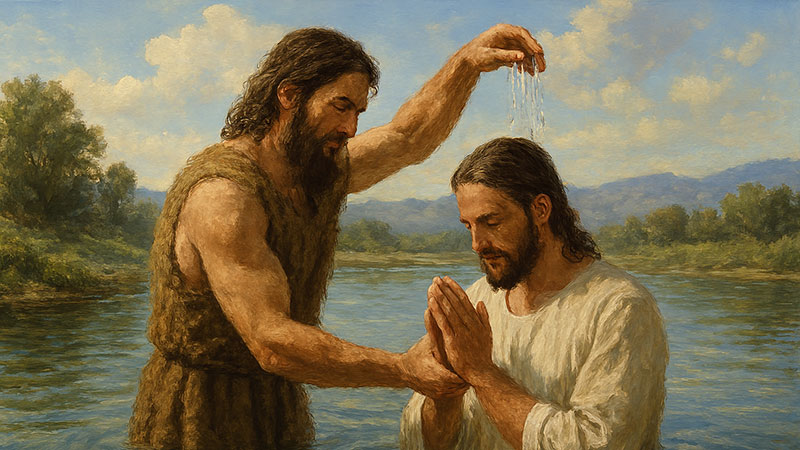Have you ever wondered about the profound spiritual journey that begins with a simple act of faith? Perhaps you’ve seen someone step into the waters of baptism and felt a tug on your own heart, a curiosity about what it truly means. Many seek to understand this significant moment in a believer’s life, asking, “What is baptism?”
It’s more than just a ritual; it’s a powerful declaration, a symbol, and a stepping stone in the Christian walk. At Peidayesh, we are here to guide those interested in Jesus, our Lord and Savior, the only way to salvation, God the Father’s Son, who was crucified for the world, and whose innocent blood was shed for our sins so that we might receive salvation and become co-heirs with Jesus Christ.
This article will examine what the Bible says about baptism, exploring its biblical roots and profound significance for every follower of Christ. We’ll uncover its meaning, purpose, and the beautiful symbolism it carries, all through the lens of scriptural truth.
Prepare to journey through the New Testament as we seek to understand this vital step of obedience and faith, discovering why it’s such a cherished and transformative experience for believers. If you’ve been asking, “What is baptism?” get ready to find answers that will deepen your understanding and draw you closer to God’s heart.
Read More: God’s Wisdom: A Guide for Believers
What Is Baptism?
To truly grasp what the Bible says about baptism, we must first understand its fundamental nature. At its core, baptism is a public declaration of a believer’s faith in Jesus Christ. It’s an outward symbol of an inward change, a visible representation of the spiritual transformation that has already taken place in a person’s heart when they accept Christ as their Lord and Savior.
It’s not a prerequisite for salvation, but rather a response to it. Think of it like a wedding ring: the ring doesn’t make you married, but it’s a beautiful, public symbol of the covenant you’ve already made. Similarly, baptism symbolizes the spiritual union a believer now shares with Christ.
The New Testament provides the clearest picture of Christian baptism. The word “baptize” originates from the Greek word baptizo, meaning “to immerse” or “to dip.” This is why most Protestant denominations practice immersion, believing it best represents the biblical imagery associated with baptism.
It’s a complete submersion, signifying a death to the old self and a resurrection to a new life in Christ. So, when we ask, “What is baptism?” we are asking about this symbolic act of spiritual identification with Jesus.
The Command and Example: Jesus’ Baptism and the Great Commission
The practice of baptism is rooted in the very example of Jesus Himself. In Matthew 3:13-17, we read about Jesus being baptized by John the Baptist. Even though Jesus was without sin and had no need for repentance, He chose to be baptized “to fulfill all righteousness.” This act set the precedent for His followers and validated the practice as an essential part of God’s plan. His baptism marked the beginning of His public ministry, demonstrating obedience and identification with humanity.

Furthermore, Jesus explicitly commanded His disciples to baptize:
In Matthew 28:19-20, often referred to as the Great Commission, Jesus instructs them: “Therefore go and make disciples of all nations, baptizing them in the name of the Father and of the Son and the Holy Spirit, and teaching them to obey everything I have commanded you. And surely I am with you always, to the very end of the age.”
This passage highlights what the Bible says about baptism as an integral part of the discipleship process. It’s not just about believing, but also about publicly identifying with Christ and committing to follow His teachings. This command underscores the importance of baptism as a foundational practice for those who choose to follow Jesus.
Symbolism and Significance: Dying to Self, Rising in Christ
One of the most profound aspects of baptism is its rich symbolism:
The apostle Paul eloquently explains this in Romans 6:3-4: “Or don’t you know that all of us who were baptized into Christ Jesus were baptized into his death? We were therefore buried with him through baptism into death so that, just as Christ was raised from the dead through the glory of the Father, we too may live a new life.”
This passage is central to understanding what the Bible says about baptism and its spiritual meaning. When a person is immersed in water, it symbolizes their death to sin and their old way of life. It represents being “buried with Christ.”
As they emerge from the water, it symbolizes their resurrection to new life in Christ, empowered by the Holy Spirit. This new life is characterized by freedom from sin’s dominion and a commitment to live righteously.
It’s a powerful visual sermon, proclaiming that the old self has passed away and a new creation has emerged through faith in Jesus. This symbolism answers a key part of the question, “What is baptism?” – it’s a vivid portrayal of transformation.
Read More: What is Jesus’ Role in the Trinity?
Baptism and the Holy Spirit: A Spiritual Reality
Beyond its symbolism, what the Bible says about baptism also connects it with the receiving of the Holy Spirit. While salvation is the work of the Holy Spirit regenerating a person’s heart, baptism is often seen as an outward act that follows this internal change and can be accompanied by a deeper experience of the Spirit.
Acts 2:38 states, “Peter replied, ‘Repent and be baptized, every one of you, in the name of Jesus Christ for the forgiveness of your sins. And you will receive the gift of the Holy Spirit.”
This passage demonstrates a clear link between repentance, baptism, and the indwelling of the Holy Spirit. While the Holy Spirit certainly begins His work at the moment of salvation, baptism is an act of obedience that positions believers to walk in the fullness of the Spirit’s power.
It’s a moment of public declaration and consecration where God’s presence is often powerfully felt. Understanding this connection is crucial when exploring what the Bible says about baptism.
Not for Salvation, But for Obedience and Identification
It’s vital to clarify a common misconception: what the Bible says about baptism is clear, that it is not a means of salvation.
Salvation is received by grace through faith in Jesus Christ alone (Ephesians 2:8-9: “For it is by grace you have been saved, through faith, and this is not from yourselves, it is the gift of God, not by works, so that no one can boast”). Baptism does not wash away sins; the blood of Jesus Christ does that.
Instead, baptism is an act of obedience to Christ’s command and a public identification with Him. It’s a testimony to the world that one has repented of their sins, placed their faith in Jesus, and is now committed to following Him.
It’s the first step of obedience after conversion, a joyful declaration of one’s new identity in Christ. This distinction is crucial for understanding the true biblical perspective on baptism and for answering “What is baptism?” in its proper context.
Who Should Be Baptized?
Given what the Bible says about baptism, who then should be baptized? The consistent pattern throughout the New Testament is that baptism follows conversion. Acts 8:36-38 provides a clear example with the Ethiopian eunuch: “As they traveled along the road, they came to some water and the eunuch said, ‘Look, here is water.
What can stand in the way of my being baptized?’ Philip said, ‘If you believe with all your heart, you may.’ The eunuch answered, ‘I believe that Jesus Christ is the Son of God.’ So he ordered the chariot to stop; and both Philip and the eunuch went down into the water, and Philip baptized him.”
This passage illustrates that belief in Jesus Christ is the prerequisite for baptism. It is for those who have consciously and personally placed their faith in Him as Savior and Lord.
Therefore, baptism is for believers, those who have repented and committed their lives to Christ. This is why in Protestant traditions, infant baptism is often replaced by believers’ baptism, emphasizing personal faith and conscious decision.
The Joy and Community of Baptism
Baptism is not just a personal act; it’s also a communal one. It is a joyous occasion for the church. The whole body of believers witnesses a new member publicly declaring their faith and joining the family of God.
It signifies the believer’s entrance into the visible body of Christ, the church. It also shows their commitment to walk with other believers. This shared experience strengthens the bonds of fellowship. It celebrates God’s transformative power.
In the early church, as shown in the book of Acts, baptism was a natural and immediate response to faith. It was a joyful and public affirmation of their new identity and allegiance to Jesus. That same sense of joy and community still surrounds baptism today. It powerfully reflects what the Bible teaches about baptism as a celebration of new life and inclusion.

Living Out Your Baptism: A New Life
Once baptized, the journey continues. Baptism is the beginning of a life lived in obedience to Christ, walking in the newness of life that it symbolizes. It’s a constant reminder of our identification with Jesus’ death, burial, and resurrection. It serves as a personal covenant to live for Him, to die to self daily, and to pursue righteousness.
The implications of what the Bible says about baptism extend far beyond the waters themselves; they call for a transformed life. This life involves growing in spiritual disciplines, serving others, sharing the Gospel, and living out the love of Christ in every aspect of our lives.
Baptism is a powerful marker, a point from which we continually look back and remember the profound spiritual transaction that occurred. It calls us to live worthy of the calling we have received in Christ.
Read More: Why You Should Join a Church: A Biblical Journey
Conclusion: A Call to New Life in Christ
In summary, what the Bible says about baptism reveals it as a deeply meaningful act of obedience, symbolism, and public declaration of faith in Jesus Christ. It is not salvation itself, but a beautiful illustration of the spiritual reality of repentance, faith, and identification with Christ’s death and resurrection.
It signifies a new life, empowered by the Holy Spirit, and a commitment to walk with God and His people. At Peidayesh, we are dedicated to guiding those interested in Jesus, our Lord and Savior, the only way to salvation, God the Father’s Son, who was crucified for the world, and whose innocent blood was shed for our sins so that we might receive salvation and become co-heirs with Jesus Christ.
We invite you to surrender your heart to Jesus and invite God into your life, embracing the transformative journey He offers.
FAQ
Baptism is a public act that declares a person’s faith in Jesus Christ. It is a symbol of an inward transformation, representing a death to the old life and a resurrection to a new life in Christ. According to the Bible (Ephesians 2:8-9), baptism is not essential for salvation, as salvation is received by grace through faith in Jesus Christ alone.
The main symbolism of baptism is identification with the death, burial, and resurrection of Christ. When a person is immersed in the water, it symbolizes being buried with Christ and dying to sin. Emerging from the water symbolizes being raised to a new life, empowered by the Holy Spirit.
Based on the New Testament pattern, baptism is for those who have consciously and personally placed their faith in Jesus Christ as their Savior and Lord. It is an act for believers and follows repentance and a heartfelt decision to follow Christ.









Add comment